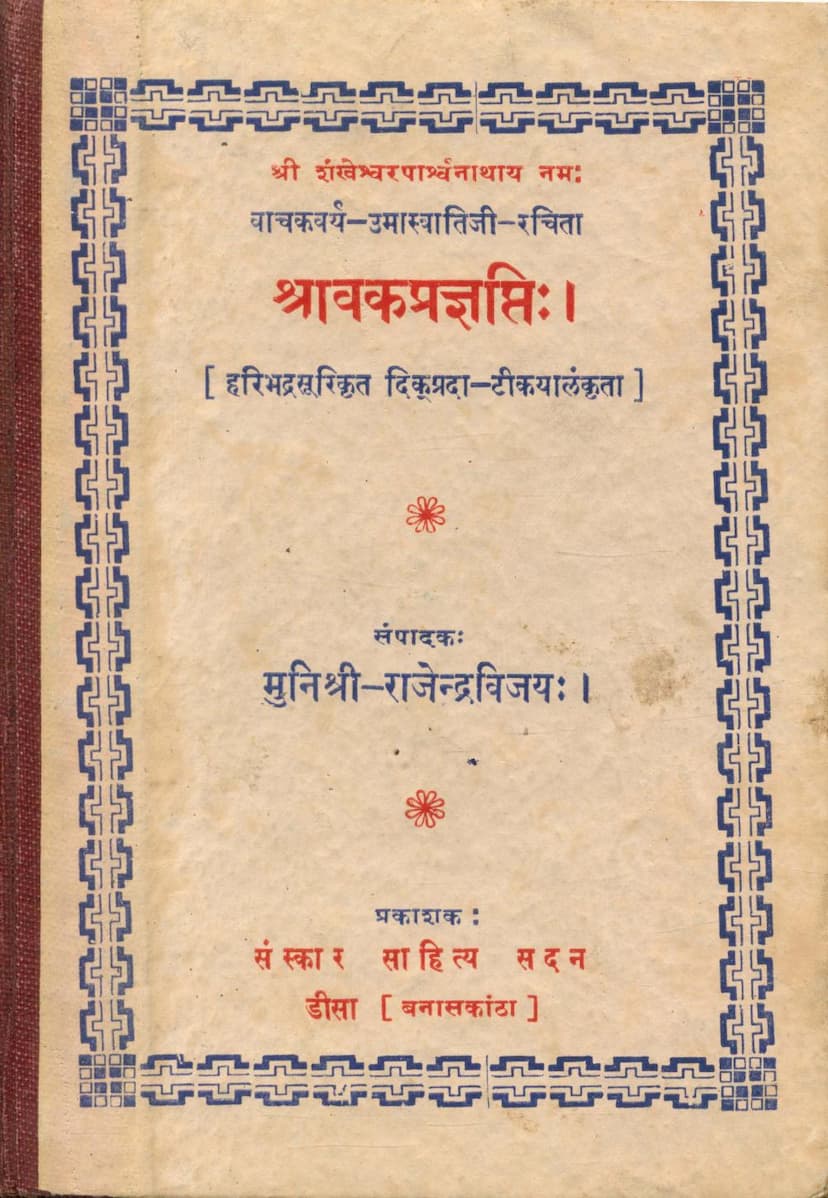Shravak Pragnpti
Added to library: September 2, 2025

Summary
Here's a comprehensive summary of the Jain text "Shravak Pragnapti" by Rajendravijay, based on the provided pages:
Overall Purpose and Context:
- The book, "Shravak Pragnapti" (also referred to as "Shravakaprajnaapti" or "Saavagapannatti"), is a Jain text that elucidates the duties and conduct of a Shravaka (a lay follower of Jainism).
- It is presented as a commentary on the original work, attributed to Acharya Umāsvāti, with a commentary by Haribhadra Suri. The editor and publisher are identified as Munishri Rajendravijay and Sanskar Sahitya Sadan, Desa, respectively.
- The text is considered a valuable resource for understanding the principles and practices of Jainism from a lay perspective.
Key Themes and Content Summary:
The text systematically details the path of a Shravaka, encompassing fundamental Jain principles and specific observances:
-
Introduction and Invocation:
- The text begins with an invocation to Lord Shankheshwar Parshvanath.
- It establishes the lineage of the work, acknowledging Acharya Umāsvāti as the author and Haribhadra Suri for the commentary.
- The editor, Munishri Rajendravijay, is credited with this particular edition, with the publication being supported by various Jain Sangh (communities) and individuals, indicating a community effort for its revival and dissemination.
-
Definition of a Shravaka:
- A Shravaka is defined by their daily practice of listening to the teachings of the Jinas and adhering to the rules of conduct (Samachari).
- This listening fosters a Navanava Samvega (ever-renewed spiritual fervor) and leads to the understanding of Tattva (reality).
- The value of listening to the Jina's teachings is emphasized, as worldly possessions like body, relatives, and wealth are transient.
-
The Twelve Vows of a Shravaka:
- The core of the Shravaka's Dharma is identified as the Twelve Vows.
- These are categorized into:
- Five Anuvratas (minor vows): These are the foundational vows, primarily concerning non-violence, truthfulness, non-stealing, chastity, and non-possessiveness.
- Three Gunavratas (qualitative vows): These vows enhance the Anuvratas and include vows related to direction, limited enjoyment/use of possessions, and abstention from useless speech/activities.
- Four Shikshavratas (training vows): These are vows for further spiritual training and include Samayika (equanimity), Deshavakashika (limited time/space), Paushadha (fasting), and Atithi Samvibhaga (alms-giving).
-
The Foundation of Samyak Darshan:
- Samyak Darshan (right faith/perception) is identified as the root and essential basis for the practice of these vows and the overall Shravaka Dharma.
- Samyak Darshan is achieved through the purification of the soul, the destruction of Granthi (deep-seated karmic blockages), and can be of three types: Kshayopashamika (due to partial destruction/suppression of karmas), Aupashamika (due to pacification of karmas), and Kshayika (due to complete destruction of karmas).
-
The Nature of the Soul and Karmas:
- The text delves into the nature of the soul (Jiva) as eternal and formless, being bound by Karmas (actions and their consequences).
- It details the eight types of karmic matter (Ashtakarmas) that obscure the soul's innate qualities:
- Jnānavarana (knowledge-obscuring)
- Darshanavarana (perception-obscuring)
- Vedaniya (feeling-producing)
- Mohaniya (delusion-producing)
- Ayushkama (life-span determining)
- Nama (body-determining)
- Gotra (status-determining)
- Antaraya (obstruction-causing)
- The detailed subdivisions of these karmas are explained, covering their various classifications and effects on the soul.
-
Spiritual Progress and Liberation:
- The text outlines the path towards Moksha (liberation) through the purification of the soul and the shedding of karmic matter.
- It explains the different stages of spiritual progress and the eventual attainment of the pure, unconditioned state of the soul.
-
Conduct and Practices:
- The text emphasizes the importance of ethical conduct, self-control, and the practice of virtues.
- Specific guidelines are given for daily activities, avoiding sinful actions, and cultivating positive mental states.
-
The Importance of Knowledge and Wisdom:
- The accumulation of true knowledge (Samyak Gyana) and right conduct (Samyak Charitra) alongside right faith is crucial for spiritual advancement.
- The text stresses the need for introspection, self-awareness, and understanding the transient nature of worldly existence.
Overall Impression:
"Shravak Pragnapti" serves as a foundational text for Jain lay followers, providing a structured framework for their spiritual journey. It emphasizes both the ethical observances and the underlying philosophical principles that guide a Shravaka towards a virtuous life and ultimately, liberation. The commentary and editorial notes suggest a commitment to preserving and making accessible these important Jain teachings.